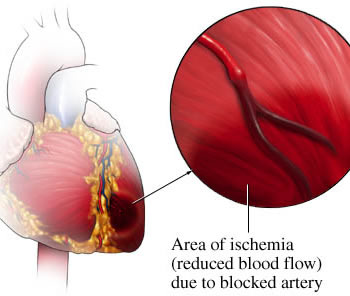|
ISCHEMIA; HYPOXIA Ischemia is a word used to describe a situation where there is not enough oxygen reaching the cells of the body. The word hypoxia means "a reduced level of oxygen at the cell level" and is often used interchangeably. When body organs become ischemic, they cannot function properly. When the organs cannot function due to inadequate oxygen, the patient is said to be in "shock". Ischemia or shock can occur for a number of reasons. One of the most common reasons is a reduction in blood flow. When there is not enough blood flow to an area, oxygen does not reach the cells (causing ischemia). Hypoperfusion is a term that describes "a reduced amount of blood flow". When ischemia develops due to low blood flow, we may describe this as "hypoperfusion". Causes for hypoperfusion include low blood pressure, heart failure or loss of blood volume. Ischemia can affect any organ of the body. Intermittent ischemia of the heart muscle (cardiac ischemia) is called angina. Intermittent ischemia of the brain is called a Transient Ischemic Attack (TIA) or "mini stroke". Other causes for ischemia include low oxygen levels in the blood due to lung disease, low hemoglobin levels in the blood (oxygen is carried by hemoglobin) or obstruction of blood vessels by blood clots. |
Image 1 : Ischemia of the heart muscle. |
|
|
|
|
|
|
|
|
|
|
|
Our masking guidelines have been updated. Visit the Patient and Visitor Masking Guidelines page for more information.



